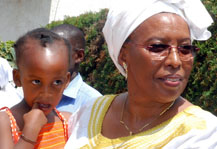International conference on breaking cycles of the past in societies affected by historical trauma presented from 5-8 December 2012
 |
Marguerite Barankitse from Burundi
28 November 2012 |
An interdisciplinary group of scholars, experts and practitioners from 24 countries around the world will gather at the University of the Free State (UFS) in Bloemfontein from 5 - 8 December 2012 for a conference on “Engaging the Other: Breaking Intergenerational Cycles of Repetition.”
The conference intends to open new avenues of inquiry into the trans-generational effects of trauma on communities that have experienced extreme violence.
One of the highlights of the conference is a presentation by Marguerite Barankitse, a survivor of the Rwandan genocide, on Thursday 6 December 2012. Marguerite has received several awards and distinctions for her work aimed at transforming the lives of Hutu and Tutsi children affected by war. Among these are the highly prestigious humanitarian prize, the Opus Prize, the UNESCO Prize, and the World's Children's Prize, also known as the ‘Nobel Prize’ for humanitarian work aimed at improving the lives of children and their chances of a better future.
On Saturday 8 December 2012 Prof. Martha Nussbaum, one of the world’s foremost philosophers, will deliver a keynote address on “Reconciliation: The political role of the Arts.” Prof. Nussbaum will receive a D.Litt. degree in the Faculty of Humanities from the UFS on 6 December 2012.
Other guests include Michael Lapsley, survivor of an apartheid bombing, Kimberlyn Leary, Associate Professor at Harvard Medical School, Dr Jean Decety, Irving B. Harris Professor at the University of Chicago and Dr Katerina Fotopoulou from the Institute of Cognitive Neuroscience at the University College in London.
One of the conference events entitled “South Africans speak about the crisis of moral leadership: A public dialogue” will be open to the public and presented in the Centenary Complex on Friday 7 December 2012 from 18:00-19:30. Participants in the public dialogue include some of South Africa’s most thoughtful social commentators and a community activist: Barney Pityana (Professor and Rector, College of Transfiguration); Prince Mashele (Director: Centre for Politics and Research); Pierre de Vos (Professor of Law, University of Cape Town); and Faeza Meyer (Chairperson: Tafelsig Residents Unite).